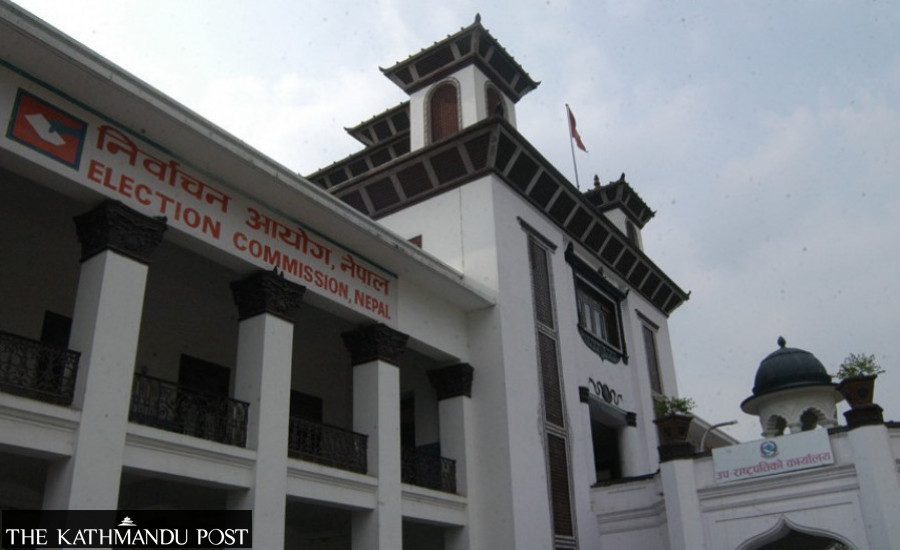National
Election Commission defends rule requiring local officials to resign before seeking re-election
Officials say rule ensures level playing field for all candidates by preventing possible misuse of state resources.
Prithvi Man Shrestha
The Election Commission on Monday clarified that it made mandatory for sitting local government officials seeking re-election to resign so as to prevent a potential scrapping of their candidacies.
As per the election code of conduct published by the commission in the Nepal Gazette Thursday, current local officials who want to contest the upcoming local elections, scheduled for May 13, must resign before filing their candidacies.
The provision, however, attracted controversy, with the main opposition CPN-UML in particular taking umbrage at it.
During a press meet on Monday, Shaligram Sharma Poudel, spokesperson at the commission, said that the existing legal provisions bar sitting local officials from contesting elections without first resigning their posts.
For example, as per Appendix 1 of the Local Level Election Regulations 2017, a candidate while filing candidacy must declare that s/he is not holding any office of profit whose remuneration or financial benefits are funded by the state.
“If anyone, quoting this provision, lodges a writ petition against a candidate who has filed candidacy without resigning his post, then the court can invalidate such candidacy,” said Poudel.
In the 2017 local elections, which were held after a gap of 20 years, no candidate was holding local office. Now that the elections are being held on schedule, the legal provision has become effective.
According to Poudel, the provision was essentially designed to ensure a level playing field for all candidates. Election experts support the legal provision.
“If a candidate still holding office uses government vehicles, resources and police to campaign for his election then it will be unfair to other candidates,” said Former Chief Election Commissioner Neil Kantha Upreti.
Election Commission officials said the provision requiring candidates to resign before seeking re-election is in line with the spirit of the constitution.
As per Section 13 (D) of the Local Level Elections Act-2017, anybody who gets remuneration from local governments or the entities under its control or ownership or entities that receive grants from local governments is unqualified to contest elections.
“We have heard arguments that elected office bearers at the local level don’t receive remuneration and that is why, the prohibitory provision of the Local Level Elections Act-2017, is not applicable to them,” said Poudel, adding, “But Article 306 of the constitution has defined any form of state benefit under the category of remuneration.”
As per Article 306 of the constitution , ‘remuneration" means and includes salary, allowance, pension and any other form of emolument and benefit. Earlier, the Supreme Court had barred elected office bearers of the local government from receiving a monthly salary.
As per the articles 87 (1E) and 178 (1F) of the constitution, the political position to be filled through election or nomination is not an ‘office of profit’ in the case of federal and provincial lawmakers.
But the constitution does not say whether the local government positions are offices of profit.
Guru Prasad Wagle, deputy attorney at the commission, told the Post on Saturday that the provision in the code of conduct requiring local officials to resign before filing candidacy was included considering officer bearers as holders of ‘office of profit.’
However, some elected representatives and politicians have argued that resignation by elected representatives before the elections would affect service delivery of local governments. The election body is, however, not convinced with the argument.
“As all elected office bearers at the local level are not expected to contest the upcoming elections, service delivery should not be affected if a few positions remain vacant for two-three weeks,” said Poudel.
The commission on Friday has asked candidates for the May 13 elections to file their nominations on April 24 and 25.
According to Poudel, local officials who are not contesting the elections can continue their duties until the elections, according to Poudel.
Section 16 (4A) of the Local Level Operation Act says a chairperson or a mayor can hand over their responsibility to their deputies and if the deputies also remain absent, to any other officer bearer of the local government, in the case they have to remain absent for more than seven days. “For the time being, even the civil servants can run the local units for a certain number of days,” said Poudel.




 8.99°C Kathmandu
8.99°C Kathmandu















